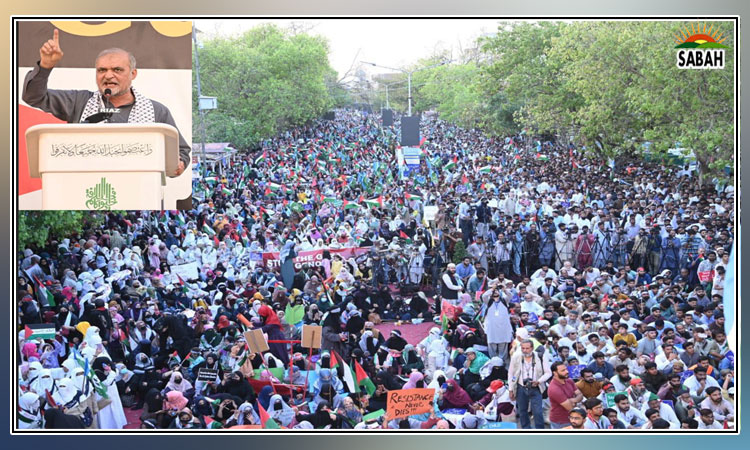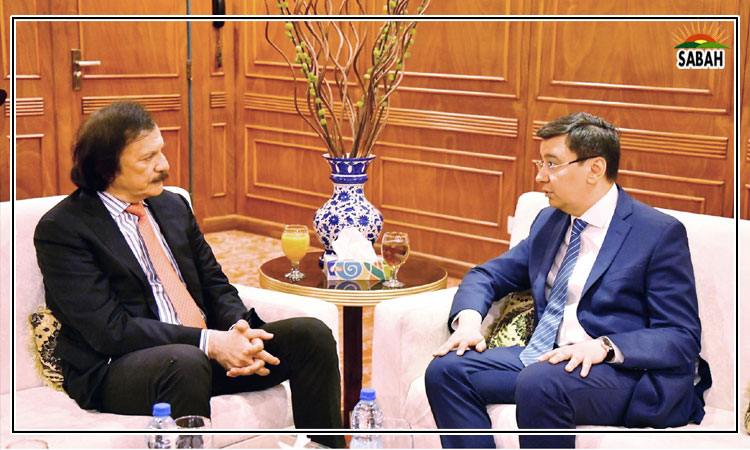Pakistan-BD proximity and scepticism in India… Dr Moonis Ahmar
Back-to-back events taking place in the context of Pakistan-Bangladesh relations, in the wake of Sheikh Hasina’s fall from power on August 5, have generated enormous apprehension, insecurity and suspicion in India.
It all started with reports about Bangladesh purchasing military ammunition from Pakistan; the celebration of the death anniversary of Quaid-e-Azam Mohammad Ali Jinnah at Dhaka Press Club; and a proposal forwarded by a Bangladeshi professor for signing a nuclear treaty with Islamabad. Other developments like efforts for resumption of direct flights; easing of visa restrictions; launch of normal trade; revival of the joint economic forum (JEC); and revitalising cultural and educational ties have led the Indian media to discuss this closeness and an ultimate potential unity of the two countries. Several conspiracy theories being pedaled by the Indian media about the new-found warmth between Pakistan and Bangladesh reflect a particular mindset in Delhi which rather wants an eternal hostility between the two Muslim countries.
The manner in which a large segment of the Indian media is exaggerating the recent thaw in Pak-BD relations reflects how insecure and suspicious New Delhi is of any move which tends to normalise ties between Dhaka and Islamabad. Still unable to reconcile with the fact that India has lost a strategic and trusted ally in Sheikh Hasina and there runs a large-scale anti-India sentiment in Bangladesh, policymakers in New Delhi will try and thwart any and every opportunity for creating closeness between Islamabad and Dhaka. Despite Sheikh Hasina having become a liability for New Delhi due to the countless cases of murder, extra-judicial killing and corruption against her, the Modi regime has gone an extra mile by defending her covert efforts to destabilise the Yunus regime. Delhi will not even entertain any official request from Dhaka to extradite Hasina.
It is not for the first time that India is apprehensive, suspicious and insecure when Pakistan and Bangladesh come closer. Even during the last days of Bangladesh President Sheikh Mujibur Rehman, Indira Gandhi viewed with suspicion his attending the second Islamic summit in Lahore in February 1974. For instance, JN Dixit, India’s first envoy to Dhaka after the emergence of Bangladesh in his book, Liberation and Beyond Indo-Bangladesh Relations, published in 1999, writes: “The contradictions in Bangladesh politics and the erosion of the commitment to Bangladesh free from its Pakistani umbilical connections which were only fostering undercurrents came out into the open during the Bhutto visit. Bhutto arrived in Dhaka in July 1974. I drove to the airport through dense crowds lining both sides of the streets all the way from the Tejgaon airport to Bangla Bhavan resounding with slogans like “Bangladesh-Pakistan Maitri (friendship) Zindabad and Zulfiqar Ali Bhutto Zindabad. I was told that people threw garlands of shoes at Sheikh Mujibur Rehman’s car and abusive slogans were shouted against the Indian High Commission and the Government of India. I have to confess that I had tears of anger in my eyes when I returned to my office.”
Dixit’s narration of his observations during his posting in Dhaka reflected how anti-Indian and pro-Pakistan sentiments augmented following Bhutto’s visit to Dhaka. During BNP’s rule also, India was apprehensive of Bangladesh’s growing rapport with Pakistan but was confident that during the Awami League regime of Sheikh Hasina, Islamabad will never get any space in Bangladesh. All calculations and hopes of New Delhi dashed when despite its enormous investment in support of Sheikh Hasina, her government collapsed. The Modi regime got the shock of its life, but never lost hope. Indian media is leaving no opportunity to embarrass the caretaker government of Dr Muhammad Yunus ,like by exaggerating the so-called attacks on the Hindu community and other acts proving Dhaka’s tilt towards Pakistan.
India’s age-old strategy to wedge hostility between Pakistan and Bangladesh and its present efforts to depict the Yunus-led caretaker government as pro-Pakistan, anti-India and pro-Islam need to be examined from three angles.
First, India’s overreaction to the reports of supply of Pakistani ammunition to Bangladesh; the holding of a programme on the occasion of Quaid-e-Azam’s death anniversary in Dhaka and the proposal to sign a nuclear treaty with Bangladesh is misplaced. Why India gets panicky when there are reports of warmth in the Pakistan-Bangladesh relations is not difficult to gauge because it would mean the burial of the narrative woven around the tragic events of 1971 which always blocks any effort for normalisation of ties between Dhaka and Islamabad. Also, there is a segment of Bangladeshi society, patronised by Awami League, which is bitterly against any fence-mending with Pakistan. The bogey of the “vulnerable” Hindu community of Bangladesh is another weapon which is used by Awami League and India, notwithstanding how the Muslims other religious minorities in India are attacked and lynched by Hindu mobs. Bangladesh has been very tolerant towards its Hindu minority but the manner in which that community is exaggerating attacks on them means it has close connections with India and is not loyal to Bangladesh.
Second, it is yet to be seen how India will react to the resumption of direct flight between Pakistan and Bangladesh because it will never allow such an interaction between the two sides. Earlier, because of Hasina’s hostile policies, Bangladesh suspended its direct travel connection with Pakistan. The resumption of direct flights through the Indian airspace will be dependent on approval from New Delhi. Technically, India cannot prevent the use of its aerospace, but we have seen how in January 1971 India banned its airspace for Pakistan after the so-called hijacking of a Ganga plane, thus widening the travel time between the two wings of Pakistan from three to six hours via Colombo.
And the suggestion by a university professor to sign a nuclear treaty with Pakistan in order to provide a security umbrella to Bangladesh may be a fallacy because the two countries will not approve anything that may have domestic, regional or international ramifications. However, celebrating the Quaid-e-Azam’s death anniversary in Dhaka is a meaningful event. This writer, as the Chief Adviser of Bangladesh-Pakistan Forum during his stay in Dhaka University as Asia Fellow in 2002, had organised two events in that University on ‘Bangladesh-Pakistan relations’ in which the then High Commissioner of Pakistan in Dhaka Ambassador, Mr Iqbal Ahmed Khan, was the Chief Guest. In fact, it was the first visit of any Pakistani Higher Commissioner to Dhaka University after December 1971.
Finally, New Delhi’s perceived efforts to block efforts for fence-mending between Pakistan and Bangladesh relations can be effectively met if the leadership of the two countries is focused on moving forward and establishing bilateral ties based on a win-win equation for both.
Courtesy The Express Tribune












